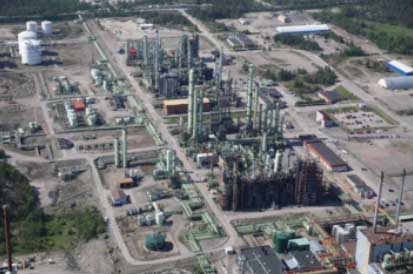Green tie-ups: Raízen/Vertoro in collaboration for lignin as feedstock for biofuels/chemicals; Infinium supplies Borealis with e-naphtha feedstock for low-carbon polyolefins
Brazil’s Raizen and Dutch chemical firm Vertoro have announced an agreement to enhance the value of lignin by transforming it into advanced, sustainable biofuels, chemicals, and materials. As a second-generation feedstock, lignin boasts a very low carbon footprint, making it an ideal solution for decarbonising hard-to-abate sectors.

As the world’s largest producer of 2nd generation ethanol, Raízen generates substantial amounts of lignin as a by-product alongside its sustainable ethanol operation, presenting a unique opportunity to contribute to the global energy transition by offering new low-carbon renewable applications for different sectors. Raizen has an expected lignin production capacity of 1.5 million tonnes (wet basis) across seven already announced and two currently operating E2G plants. The potential production is up to 3.4 million tonnes (wet basis) across 20 E2G plants.
Vertoro will apply its technology to this collaboration, focusing on upgrading the lignin into a form that dissolves and blends more easily with other materials, thereby simplifying its transformation and making it suitable for a variety of applications. Vertoro’s patented approach transforms woody and other agricultural residues into a wide range of bio-based chemicals, materials, and fuels.
“Raízen already plays a pivotal role in the global energy transition by being the only company that has succeeded in producing cellulosic ethanol on a commercial scale. Now, by integrating our growing 2nd generation ethanol production with Vertoro’s innovative lignin conversion technology, we foresee a transformation in the way lignin is perceived and utilised globally,” said Mateus Lopes, Energy Transition Director at Raizen.
Throughout the agreement, Raízen and Vertoro will engage in three collaborative initiatives. The first involves developing a unique blend of lignin with ethanol or methanol, utilising Vertoro’s proprietary “Goldilocks” process, that allows lignin application in higher value products. This blend is designed to be used as sustainable fuel in dual-fuel maritime engines, aiming to enhance both the efficiency and power output of biofuel production.
Simultaneously, the partnership will assess the feasibility of using this blend in oil refining processes to create Sustainable Aviation Fuel (SAF), sustainable marine fuel and various other chemicals. Additionally, the companies will focus on developing pure, low molecular weight lignin, suitable for use in chemical and material applications.
The collaboration will initially focus on producing large-scale samples of Raízen’s new lignin products at Vertoro’s running demo plant, which are derived using Vertoro’s Goldilocks bio-technology process, at Vertoro’s demonstration plant in the Netherlands. These samples will be distributed to selected producers in the fuel, chemical, and materials sectors for application testing. The ultimate goal is to secure offtake agreements for a commercial-scale production site, which will be integrated into Raizen’s 2nd generation ethanol facilities. Initial testing is to commence in summer 2024.
New Infinium eNaphtha to serve as sustainable feedstock alternative for plastics used to manufacture consumer goods

In other news, eFuels supplier Infinium and Austrian polyolefins maker Borealis have entered into an agreement to enable the production of low-carbon-footprint polyolefins generated from waste carbon dioxide (CO2) emissions. These polyolefins are commonly used in manufacturing consumer goods including packaging, appliances, apparel and medical devices.
As the world’s first supplier of commercial volumes of e-naphtha, a sustainable drop-in alternative to traditional fossil-based naphtha, Infinium is helping to decarbonise plastics production and reduce harmful CO2 emissions globally. It is manufactured at the company’s Project Pathfinder facility in Corpus Christi, Texas, US, and commercial volumes are being shipped to Borealis’ Porvoo facility in Finland, which provides sustainable polyolefin solutions to its manufacturing customers. The world’s first commercial eNaphtha shipment left the US in May.
Plastics made from Infinium e-naphtha can be produced using the same facilities and manufacturing equipment and recycled in the same way as with a conventional naphtha-based product. It has also received ISCC PLUS certification from the International Sustainability and Carbon Certification (ISCC) body. This certification system ensures the traceability of the sustainably produced feedstock from its point of origin throughout the entire chain of custody.
The unique partnership and supply chain development between Infinium and Borealis is an example of how innovators can collaborate toward novel solutions to meet growing consumer demand for circularity and defossilisation, say the companies.
(PRA)SUBSCRIBE to Get the Latest Updates from PRA Click Here»







